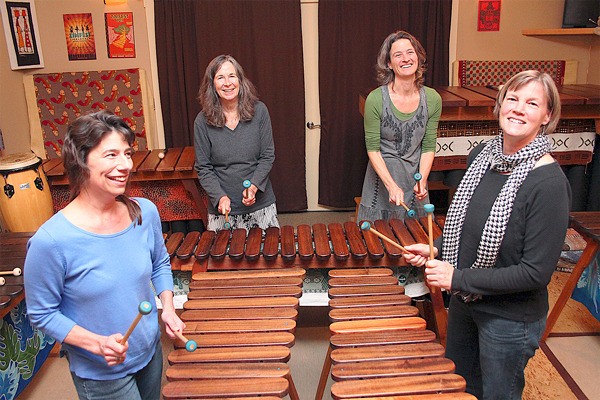The storytellers of Sarungano have quite the tale to tell.
Dana Moffett, Leslie Breeden, Donita Crosby and Dyanne Harshman went to Zimbabwe earlier this year, largely thanks to donations and fundraising on South Whidbey, to perform with the African country’s traditional instruments and donate several to an orphanage. They have become ambassadors of music, trying to aid in the restoration of a custom stripped from the land’s native people.
“It is important for them to have the music and their traditional music,” Moffett said.
Under colonial rule, many of the native customs and traditions, including the music, was outlawed. Slowly it is being restored, but in a country with high unemployment, spending money on music is not a top priority.
That’s where the women of Sarungano — a Shona word for storyteller — filled a gap in April. About $1,800 was raised through donations prior to their trip, and all of that was spent securing instruments and lessons.
Inside Moffett’s studio, the band keeps a poster made by the children from the Child Future Africa orphanage and music school that received the instruments and music lessons. There are several pictures on it below the word, “Tatenda!,” which is Shona for “Thank you!”
That spirit of thanksgiving is what Sarungano wanted to extend to the people who made it happen at an event last weekend. Sarungano put on a presentation of slideshows and stories Saturday at Black Box Theater in Langley as a show of appreciation for what was accomplished through South Whidbey’s goodwill.
Two different instruments were donated to the orphanage: mbiras and marimbas. Mbiras, sometimes called “thumb pianos,” are made of a wooden board with attached metal tines. They are staggered to produce different notes and placed in a wooden resonator to amplify the sound. The marimba is like a xylophone.

Sarungano purchased eight hand-made mbiras from a musician they knew in Zimbabwe. All of them were donated to children in an orphanage, and instruction from professional musician Jacob Mafuleni was covered by the funds.
Lessons cost about $100 per month, and the mbiras were $75 each. In the United States, an mbira can cost as much as $350. The South Whidbey women said they hope to continue financing lessons and purchasing instruments for the orphanage and music school.
“We’re hoping it can be an ongoing project,” Moffett said.
During the two-week trip, the women performed at a wedding and toured schools and the capital city of Harare.
Moffett, who teaches mbira and marimba from her home studio outside of Langley, said it was a surreal experience to perform in front of the people who inspired and taught her.
That experience was shared by her fellow Sarunganoans.
“There were people who couldn’t believe there were four middle-age white women who could sing in Shona,” said Breeden, who made her first trip to the mbira’s homeland.
Added Crosby: “We’ve been told it’s an inspiration to them to have a group of women playing their traditional music.”
To learn more about this South Whidbey band go to www.sarungano.com


